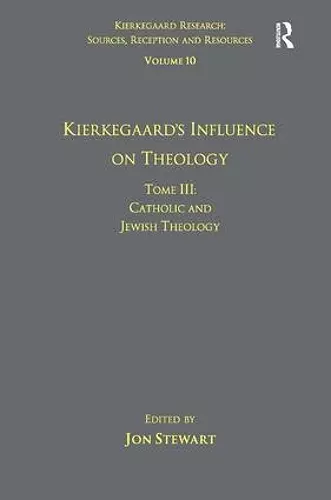Volume 10, Tome III: Kierkegaard's Influence on Theology
Catholic and Jewish Theology
Format:Hardback
Publisher:Taylor & Francis Ltd
Published:19th Jun '12
Currently unavailable, and unfortunately no date known when it will be back
This hardback is available in another edition too:
- Paperback£56.99(9781138257375)

Kierkegaard has always enjoyed a rich reception in the fields of theology and religious studies. This reception might seem obvious given that he is one of the most important Christian writers of the nineteenth century, but Kierkegaard was by no means a straightforward theologian in any traditional sense. He had no enduring interest in some of the main fields of theology such as church history or biblical studies, and he was strikingly silent on many key Christian dogmas. Moreover, he harbored a degree of animosity towards the university theologians and churchmen of his own day. Despite this, he has been a source of inspiration for numerous religious writers from different denominations and traditions. Tome III explores the reception of Kierkegaard's thought in the Catholic and Jewish theological traditions. In the 1920s Kierkegaard's intellectual and spiritual legacy became widely discussed in the Catholic Hochland Circle, whose members included Theodor Haecker, Romano Guardini, Alois Dempf and Peter Wust. Another key figure of the mid-war years was the prolific Jesuit author Erich Przywara. During and especially after World War II Kierkegaard's ideas found an echo in the works of several trend-setting Catholic theologians of the day such as Hans Urs von Balthasar, Henri de Lubac and the popular spiritual author Thomas Merton. The second part of Tome III focuses on the reception of Kierkegaard's thought in the Jewish theological tradition, introducing the reader to authors who significantly shaped Jewish religious thought both in the United States and in Israel. These theologians represent a variety of religious and political backgrounds: the spiritual world of Hasidism, Modern Orthodox Judaism of Mithnaggedic origin, and Modern Religious Zionism.
'Kierkegaard Research: Sources, Reception and Resources is continuing to prove a remarkable achievement, and is cumulatively providing an important point of reference for all those working on Kierkegaard, whether they are specialists looking to follow up on some aspect of his work or its reception that lies outside the purview of their own research or whether they are novices looking for a way ’in’, perhaps so as to check out why or how Kierkegaard relates to their own primary field of study... The systematic organization of the work means that topics that have often been neglected in writing about Kierkegaard get their due, a comment that is particularly relevant to the present volume, since the significance of Kierkegaard for the Catholic thinkers dealt with here has tended to fall beneath the horizon of their commentators, at least in the English-speaking world... Like other volumes in the series, this contains work of very high quality, thoroughly researched and clearly presented... the essays are of a consistently high quality, very thorough, and, in addition to filling out the overall historical narrative of Kierkegaard reception occasionally offer surprising and even provoking angles on the Kierkegaard texts themselves.' Marginalia
ISBN: 9781409444800
Dimensions: unknown
Weight: 600g
234 pages